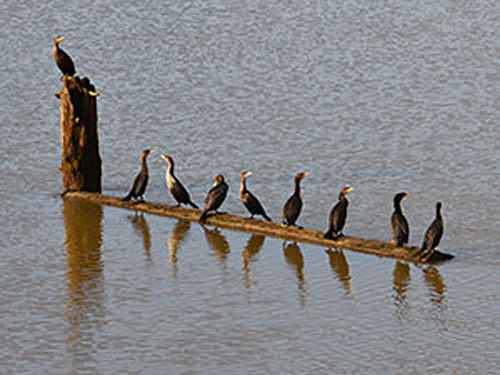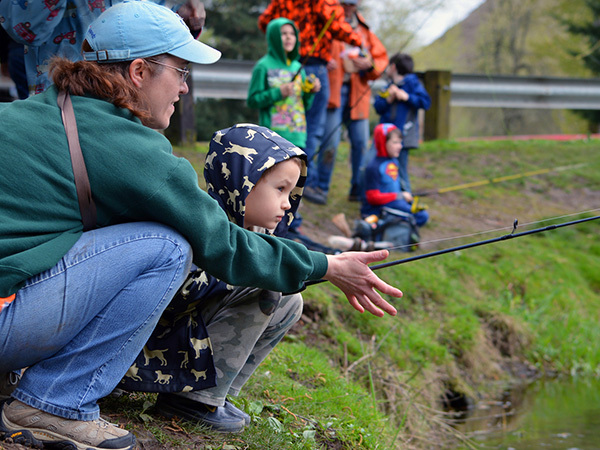Oregon Fish Report
Fish Report for 3-28-2016
Fish Report for 3-28-2016
Cormorant harassment aims to protect young fish

by OR Department of Fish & Wildlife Staff
3-28-2016
Website
TILLAMOOK, Ore. – Harassment, or “hazing”, of double-crested cormorants is set to begin soon in several areas along the Oregon Coast to improve survival of juvenile salmon.
Double-crested cormorants are fish-eating waterbirds that occur throughout the state. The species is an Oregon native, and is particularly prevalent on the state’s estuaries during April through October. Research indicates cormorants can consume significant numbers of juvenile salmon during this time period.
To reduce the threat to young fish, the Oregon Department of Fish and Wildlife (ODFW) is working with several nonprofit and local governmental organizations to haze cormorants on six coastal estuaries over the next two to four months.
Hazing will involve driving the birds from locations where juvenile salmon are seasonally concentrated, toward areas where non-salmon fish species are more abundant. Workers will use boats and, on some estuaries, small pyrotechnics, to accomplish the task.
Hazing is intended to increase the survival of both wild-spawned and hatchery salmon juveniles as they migrate to the ocean. Some of these spring migrants represent species that are experiencing conditions of conservation risk, including coho salmon, which is federally threatened in Oregon under the Endangered Species Act.
Hazing workers are being provided by the Clatsop County Fisheries Project, Port of Nehalem, Port of Bandon, North Coast Salmon and Steelhead Enhancement Fund, and Alsea Sportsmen’s Association. ODFW will provide a portion of the funding and program oversight, and will conduct some hazing operations itself to protect hatchery releases on the lower Columbia River.
Hazing will take place as early as April 1 and continue through May 31 on the Nehalem, Nestucca, and Coquille river estuaries, and on Tillamook and Alsea bays. The program will continue through at least July 31 on the lower Columbia River, where hazing will occur at a variety of locations, including Young’s Bay, Blind Slough, and Tongue Point.
Double-crested cormorants are fish-eating waterbirds that occur throughout the state. The species is an Oregon native, and is particularly prevalent on the state’s estuaries during April through October. Research indicates cormorants can consume significant numbers of juvenile salmon during this time period.
To reduce the threat to young fish, the Oregon Department of Fish and Wildlife (ODFW) is working with several nonprofit and local governmental organizations to haze cormorants on six coastal estuaries over the next two to four months.
Hazing will involve driving the birds from locations where juvenile salmon are seasonally concentrated, toward areas where non-salmon fish species are more abundant. Workers will use boats and, on some estuaries, small pyrotechnics, to accomplish the task.
Hazing is intended to increase the survival of both wild-spawned and hatchery salmon juveniles as they migrate to the ocean. Some of these spring migrants represent species that are experiencing conditions of conservation risk, including coho salmon, which is federally threatened in Oregon under the Endangered Species Act.
Hazing workers are being provided by the Clatsop County Fisheries Project, Port of Nehalem, Port of Bandon, North Coast Salmon and Steelhead Enhancement Fund, and Alsea Sportsmen’s Association. ODFW will provide a portion of the funding and program oversight, and will conduct some hazing operations itself to protect hatchery releases on the lower Columbia River.
Hazing will take place as early as April 1 and continue through May 31 on the Nehalem, Nestucca, and Coquille river estuaries, and on Tillamook and Alsea bays. The program will continue through at least July 31 on the lower Columbia River, where hazing will occur at a variety of locations, including Young’s Bay, Blind Slough, and Tongue Point.
More Reports
Free youth fishing event Saturday at Canby Pond
Canby Pond
3-28-2016
CLACKAMAS, Ore. — Hundreds of feisty rainbow trout will be lurking in the waters of Canby Pond on Saturday, April...... Read More
OR Department of Fish & Wildlife Reports
for Tuesday, March 22nd, 2016
Kilchis River: Kilchis River Fishing Report
Necanicum River: Necanicum River Fishing Report
Nehalem River: Nehalem River Fishing Report
Nestucca River: Nestucca River Fishing Report
: Olalla Lake Fishing Report
Salmon River: Salmon River Fishing Report
Tillamook Bay: Tillamook Bay Fishing Report
Trask River: Trask River Fishing Report
Applegate River: Applegate Reservoir Fishing Report
Applegate River: Applegate River Fishing Report
Arizona Pond: Arizona Pond Fishing Report
Ben Irving Reservoir: Ben Irving Reservoir Fishing Report
Chetco River: Chetco River Fishing Report
Diamond Lake: Diamond Lake Fishing Report
Elk River: Elk River Fishing Report
Emigrant Reservoir: Emigrant Reservoir Fishing Report
Expo Pond: Expo Pond Fishing Report
Fish Lake : Fish Lake Fishing Report
Floras Lake: Floras Lake Fishing Report
Galesville Reservoir: Galesville Reservoir Fishing Report
Garrison Lake: Garrison Lake Fishing Report
Hemlock Lake: Hemlock Lake Fishing Report
Howard Prairie Reservoir: Howard Prairie Reservoir Fishing Report
Hyatt Lake: Hyatt Lake Fishing Report
Illinois River: Illinois River Fishing Report
Lake Marie: Lake Marie Fishing Report
Lake Selmac: Lake Selmac Fishing Report
Lemolo Lake: Lemolo Lake Fishing Report
Loon Lake: Loon Lake Fishing Report
Lost Creek Lake: Lost Creek Reservoir Fishing Report
Plat I Reservoir: Plat I Reservoir Fishing Report
Tenmile Lakes: Tenmile Lakes Fishing Report
Toketee Lake: Toketee Fishing Report
Willow Lake: Willow Lake Fishing Report

www.OregonFishReports.com © 2024. All Rights Reserved.
Website Hosting and Design provided by TECK.net
Website Hosting and Design provided by TECK.net
